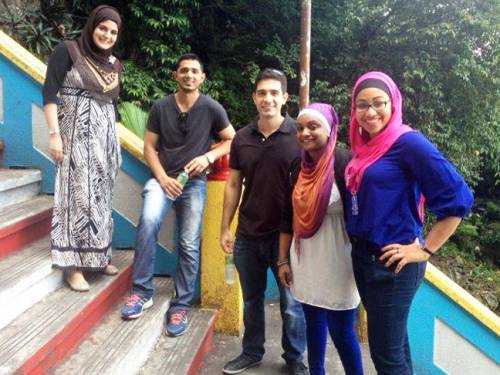Well this post has been a long time coming.
Having been fortunate enough Alhamdulilah to have spent the last few months travelling, I have come to realise that although I am born in Sudan, my cultural norms and expectations and behaviours are in fact, largely Australian. Even though my parents brought me up speaking Arabic and sticking largely to Sudanese/Arab norms, having spent some time in Sudan now, there are still a few cultural differences that have, well, shocked me (just a tad ya' know...).
It truly does reinforce the fact that visiting a country and living in a country are completely different things.
That being said though, now having traveled briefly through Asia, there are also a few things that were unexpectedly different and caught me by surprise. I do love the realisation that others truly do things differently so here are a few things that caught my attention...In this first part of the series I will talk mostly about the more superficial cultural differences I experienced in Asia (superficial only because I was a visitor here and haven't immersed myself in the culture enough to know more), and will continue tomorrow with those I have found in Sudan.
1. Difference in concepts of "Personal Space"
While travelling in Malaysia and Singapore, and even in Sudan, I noticed that there was quite a different concept of the "personal bubble". Perhaps because in Australia I am used to such large spaces with such few people: strangers rarely come too close (unless you hop on a full bus or train) and if they bump into you, people usually apologise. That same concept doesn't seem to exist everywhere else -- at first when someone bumped into me or stood really close and didn't apologise I felt quite affronted, until I realised that was perhaps the norm...

2. Shop keepers "waiting and watching"
This only happened in Malaysia but it become something that really did frustrate me. I would enter a shop, greet the shop keeper and begin browsing... only to find the shop keeper standing half a meter away, looking at me expectantly. I would smile, move away...and she would follow me! Again, this relates to the personal space thing, but I felt quite strangely uncomfortable with someone essentially watching over my shoulder. It was a strange feeling, almost as if I was concerned about the lady judging my choices or trying to hurry me up... Either way, quite often I would either say to the person (more than once) "I'm ok, I can deal with it from here..." or "I will let you know when I am done..." and if they insisted on just standing there or following me, I thanked them and left the shop. It really did make my retail therapy a little...strange.
3. Difference in height and size in general
Now, I don't think I am an extremely tall or large person per se, I just have ahem "presence" (and as my grandmother likes to say, "large bones"). What this means though is that in places such as Singapore and Malaysia, not only does nothing fit (the largest shoe size in all the shops is two sizes smaller than mine...) but the beds in the hotels are too short! I honestly laughed when I lay on the bed and found my feet hanging off the end...
4. Different sense of humour
I think this applies to all the places I have traveled... the dry, ironic humour that I am used to (witty repartee as I like to think, haha) doesn't seem to translate as well, either in the South East Asian nations or in Sudan. I am usually met with confounded looks or a picture of slight offense. My days of being the joker..well, are quite over.
Oh. Perhaps everyone in Australia just laughed at my jokes to be polite? One will never know...
5. Food
Suffice to say, I loved it (the extra few kilos on my torso that I left Malaysia with will attest to that). However the idea of rice, noodles and curries (?) for breakfast, lunch and dinner was a little strange at first. Lucky my stomach isn't too fussy!

So these are some of the more day to day (superficial la) differences that I found interesting and unexpected. Living in Sudan though, some of the cultural differences are a little more difficult to deal with and do hit more close to home..
 Defining ‘Australia in the Asian Century’ has been the subject of some debate since the release of the Federal Government’s White Paper in October last year. But how much do we know about the neighbourhood we are calling our own?
Defining ‘Australia in the Asian Century’ has been the subject of some debate since the release of the Federal Government’s White Paper in October last year. But how much do we know about the neighbourhood we are calling our own?




